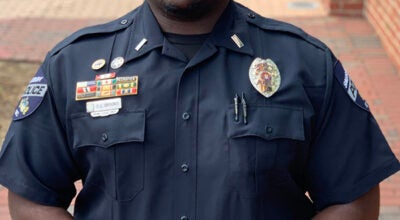Published 12:00 am Saturday, November 2, 2013
SALISBURY — The crowded Salisbury City Council race has remained mostly courteous, and candidates have worked to make themselves stand out during a variety of forums and months of campaigning.
All five incumbents — Mayor Paul Woodson, Mayor Pro Tem Maggie Blackwell and council members Karen Alexander, Pete Kennedy and Brian Miller — are running for re-election against four challengers, including William Peoples, Rick Honeycutt and Blake Jarman. Challenger Dale Stephens is apparently still in the race but has not campaigned or responded to questions from the Post.
Challenger Tom Speaks withdrew, but his name will still appear on the ballot. The election is Tuesday.
If re-elected to his 11th term, Kennedy, will become the longest-serving councilman in Salisbury history. Despite his longevity on the council, or perhaps because of it, Kennedy uses the slogan “consistent positive change.”
During the campaign, Kennedy has calmly and staunchly defended city policies, including the decision to create Fibrant in 2008. Kennedy, who was instrumental in coming up with the idea of a high-speed, fiber-optic broadband utility to attract jobs with the fastest Internet speed in the state, remains one of Fibrant’s most vocal supporters.
Kennedy, 73, who opened his comments during a recent forum with the Serenity Prayer, never fails to pitch his Facebook page and Twitter account while campaigning.
“I think outside the box, and I am analytical in my reasoning,” said Kennedy, a small business owner and former educator.
Challengers looking to unseat an incumbent are again criticizing City Council’s decision to launch Fibrant, which will cost more than $70 million over 20 years.
Now that the utility is up and running, calls for ending Fibrant have died down, but challengers say the city should cut prices for subscribers.
Peoples, a retired welder, said the city has missed an opportunity to sell Fibrant to people living in apartments. Woodson, a small business owner, said it has been too expensive to wire apartment buildings until now, and Fibrant is testing a cost-efficient radio frequency technology to serve buildings with multiple users.
The technology uses cable splitting to serve large locations, where Fibrant would hook onto existing coaxial cable, said Woodson, who has named getting Fibrant into apartment buildings as a top campaign priority.
The city’s Fibrant deployment strategy changed last year from fast and furious to slow and controlled, which costs less but also generates less revenue.
Fibrant turned its first profit — about $7,700 — in the first quarter of this year after cutting millions of dollars in costs, including moving most employees out of the department. In the current budget, three people are listed as Fibrant employees, with total salaries of $172,383.
That’s down from 11 Fibrant employees in last year’s budget with total salaries of $447,236 and 10 Fibrant employees two years ago with salaries of $499,149.
Honeycutt, a small business owner, repeatedly has called Fibrant a “huge liability that must be turned into an asset.” It makes his top 10 list of problems to fix, including the crime rate, gangs, tax dollar waste, short-staffed city departments, unemployment, school central office and the city’s ailing relationship with Rowan County.
While advocating for more police officers, Honeycutt also has taken a no-tax-increase-ever pledge. Some candidates say his math doesn’t add up.
Unlike Honeycutt, a political newcomer, Jarman is hoping the third time’s the charm. He rarely misses a chance to tell voters he’s making his third bid for City Council and that he doubled his votes in his second attempt.
A personal banker, Jarman received 344 votes in 2009 and 657 votes in 2011. Between 13,000 and 14,800 votes were cast in those elections.
Jarman campaigns on peace, prosperity and a new perspective and has increasingly defended Rowan County commissioners in the ongoing city-county feud.
Miller, on the other hand, has been the most vocal and pointed critic of the county’s ruling majority. A commercial banker, Miller said City Council offers a stark contrast to the county commission.
“We plan, we study, we act,” he said at a recent forum. “There is no visioning process at our county level at this time, and I think there is a vacuum of leadership.”
Critics like to take aim at the city’s methodical and lengthy planning process, which often includes citizen task forces, high-dollar consultants paid for mostly by grants and studies that can run for more than 100 pages. But incumbents embrace the concept.
“Planning is a very important endeavor for our community,” said Alexander, an architect and small business owner. “It’s through these plans that we can plan for the resources that we need.”
Several incumbents like Alexander cut their teeth as members of the Salisbury Planning Board, and City Council has traditionally encouraged, even begged, residents to participate in the planning process.
Peoples has served on numerous Salisbury boards and commissions and holds a key to the city, bestowed by former Mayor Susan Kluttz for what she called his efforts to hold elected officials accountable. A regular critic of the city, Peoples said he has “no personal bone to pick” with any incumbent but has a problem with “bad decisions over the years,” including launching Fibrant without a referendum.
One of 15 children and the recent recipient of a donor kidney, Peoples ran for City Council in 2009 but basically dropped out after his sister died. He often demands more public transportation, more street lights, less crime and better housing and has criticized the city for not hiring enough African Americans.
“Let the work I’ve done speak for me,” Peoples said.
Blackwell, who had a career in business and technology and now serves the city full-time, is the liaison to more boards and commissions than any other City Council member, she said at a recent forum.
Blackwell, who was not shy about her accomplishments and work ethic, told voters the city is more transparent thanks to her efforts to put City Council phone numbers and email addresses on the city’s website, as well as demanding quarterly financial updates from city staff.
When a submitted question at a forum accused City Council of being out of touch with poor neighborhoods, Blackwell recited a list of housing projects she’s visited and earned a chuckle when she boasted that she and Woodson completed a walking tour of the West End neighborhood, and she did it in high heels.
Salisbury does not hold a separate election for mayor. Traditionally, the top vote-getter in the City Council race is tapped by other members as mayor.
Woodson unseated Kluttz, the city’s longest-serving mayor, by 35 votes in 2011. He makes no secret of the fact that he wants to hold onto the mayor’s office, and Blackwell likely will provide the toughest competition.
Blackwell beat Woodson in 2009 as the second-highest vote-getter, earning the office of mayor pro tem under Kluttz. Then Woodson surprised most observers by coming in first in 2011.
When Kluttz left City Council this year to become state secretary for cultural resources, Woodson suggested the council name Blackwell as mayor pro tem again.
After Kluttz’s departure, Woodson also appointed Alexander to the council, saying he wanted to replace Kluttz with another woman and was impressed with Alexander’s work as chairwoman of the Salisbury Planning Board.
If Alexander wins election Tuesday, it will be her first. She lost a bid for school board several years ago by a close vote.
Miller has come in fourth in his two City Council elections, beating Kennedy by about 100 votes in 2009 and about 300 votes in 2011. Miller made a point at a recent forum of thanking all candidates for running and said his idea of public service is to “leave whatever situation you are in better than you found it.”
“Our best days are ahead of us,” said Miller, who campaigns on tax-base growth and providing a business-friendly environment.
Kennedy is running one of his most visible campaigns to date. During his long City Council tenure, Kennedy has come in second and served as mayor pro tem, but he kept his seat at the table by just 119 votes in 2011, edging out challenger Rip Kersey.
One-stop voting ended at 1 p.m. Saturday, but polls open at 6:30 a.m. Tuesday. Salisbury residents will have until 7:30 p.m. to choose their next City Council.
Contact reporter Emily Ford at 704-797-4264.





